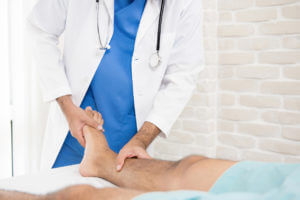
How many different kinds of shoes did you see the last time you went into a shoe store or looked through a shoe store’s website? We tend to go for glitz over fits when it comes to shoes, but your feet beg to differ.
Any foot and ankle doctor will tell you how crucial it is to choose the right shoes for your feet. After all, these physicians are the ones who often have to treat large bunions caused by high-heeled shoes, sores and infections due to tight-fitting shoes, and plantar fasciitis caused by shoes that do not provide enough support to the arches.
Let’s talk about what a foot and ankle specialist recommends insofar as choosing the best shoes for your feet, and where you can go in North Jersey for outstanding podiatry care.
Appropriate Shoe Fit
Your feet require sufficient space and support in a shoe to be able to move with confidence while standing, walking, and even running. Here are important factors to consider when choosing the right fit for your shoes:
Space
Your shoes should allow your feet and toes some wiggle room, but not too much. Never sacrifice shoe fit for anything else, including aesthetics.
A good rule of thumb is that your shoes should have about a half-inch of space between your big toe and the front part of the shoe. Shoes with a wider “box” (the toes area) are generally better, as pointed tips might force your toes to bend and squish inward, causing foot pain and possibly bunions.
Size
Your left and right foot might not be the same size. If this is the case, choose shoes that best fit your larger foot. The shoe that accommodates the smaller foot can be adjusted by adding an insert. Your foot doctor can provide the ideal solution that will not feel awkward or uneven for your feet.
Don’t assume that shoes will stretch with time; assess shoes based solely on how they fit now. Plus, it is best to try on shoes during the late afternoons or evenings to account for the natural swelling of your feet throughout the day.
Sufficient Cushioning
Your feet bear repetitive stress throughout the day as you walk or stand. You’ll typically be walking on hard surfaces, so choose shoes with adequate cushioning inside. They should feel very, very comfortable when walking in them.
Avoid cushions that target pressure points on your feet. Over time, the skin at these spots will thicken, forming corns and calluses. Choose shoes that distribute your weight evenly across your feet.
Adequate Arch Support
Your feet have a natural arch that helps bear your body’s weight. People have different arch types, and your shoes should account for the arch that you have:
Flat Feet
People with flatfoot may have balance difficulties due to the unnatural distribution of stresses within their feet. However, wearing the appropriate type of shoes can help alleviate this issue. For flat arches, go for shoes with flatter shapes and provisions for stabilization.
High Arch
On the opposite end of the arch spectrum, people with high arches might have feet that can’t absorb impacts well. They are also at risk of developing foot and ankle conditions if they perform vigorous high-impact activities. If you have a high arch, it’s best to find shoes with extra cushioning for shock absorption.
Neutral and Natural Arch
People with neutral arches benefit the most from shoes with moderate stability and firm midsoles.
Foot and Ankle Specialist in Northern New Jersey
Choosing the right shoes involves getting the correct fit, checking for good cushioning, and selecting the appropriate arch type.
It may seem excessive to consider so many factors when shopping for footwear. However, any foot and ankle doctor will tell you that your shoes are a key investment in your health, because they influence everything from your posture to the health of your knees and hips.
Take the next step by consulting with a foot and ankle specialist to figure out whether you need special considerations for footwear. Contact us at Hudson MD Group today by calling our main office in West Orange at (973) 705-4914 or by using our contact form. We look forward to seeing you!


